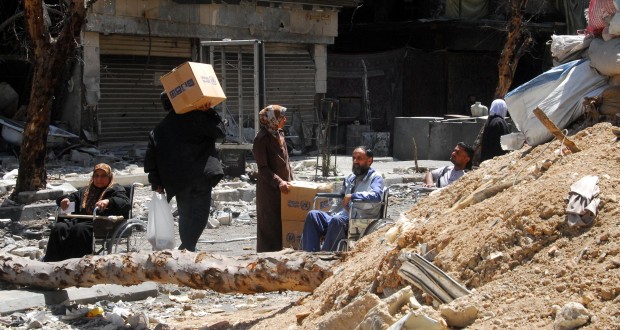Damascus, SANA – As if it was not enough for the Palestinian refugees living in Yarmouk camp, a neighborhood in the south of the Syrian capital Damascus, to be away from their dear homeland which has been usurped by the Israeli occupation for decades, just for their ordeal to be compounded by a life-stifling siege which terrorist groups have imposed on them since late 2012.
An estimated 20,000 people are currently trapped in the camp, most of them displaced Palestinians of those who fled the Israeli occupation authorities’ persecution and racist practices, but some of them are Syrian citizens. These people have been feeling as if they’re living in limbo, laboring to remain alive, which to some residents is an effort that seems almost impossible.
For many of those individuals and families, life at the terrorism-devastated camp turned into a living hell. They are powerless to get the basic needs to survive, since the terrorist groups which have taken over the camp have been preventing any delivery of food or necessary medical and other non-food requirements, practically starving the inhabitants to death and rendering them too feeble to resist even common and easily-cured diseases, to say nothing of life-threatening and terminal diseases which require special medication and care.
“We are literally dying here… The gunmen have left us with nothing to live on. I feel helpless. How am I going to provide for my wife and four little kids?” A 58 year-old man from the camp said, with tears welling up in his weary eyes.
“They [the gunmen] don’t just prevent us from going out to bring food and medicines or letting in aid materials. They even robbed our houses and stole all our possessions,” another resident said.
A most heart-breaking story, which unfortunately was not a unique case as we were told, is that of a little kid dying of dehydration and malnutrition.
Even students were prevented by the armed groups from crossing outside the borders of the camp to go to their schools and universities.
Zeina, a fourth year university student, barely managed to contain her tears from running down her sunken cheeks when she recounted how much sad and hopeless she felt when she could not take her final graduation exams.
Indispensable and vital as they are, the shortages of food, formula milk for infants, medicine, and fuel derivatives, are not the only concerns that keep the inhabitants of the camp on edge.
The locals’ utmost and unspeakable fear is that of the ever-present threat of being killed at the hands of the terrorist groups which, since the outbreak of the externally-devised terrorist war against Syria in 2011, have provided abhorrent examples of unprecedented brutality wherever they spread their influence.
Decapitation, dismemberment, mutilation, mass executions, gang-rape, and cannibalism, are among the most abhorrent of the appalling means of torture and manifestations of unbridled savagery perpetrated by the terrorists on civilians and military personnel alike. Photos and videos of these heinous acts go viral on the internet and social media daily.
In the face of this situation, the Syrian government did not stand idle. Its response to the deafening outcry of intense suffering by Yarmouk camp’s inhabitants came as quickly as possible, rallying all efforts, most importantly urgent humanitarian efforts, to provide a breathing space to the Palestinians and their fellow Syrians besieged in the camp.
The government actually rolled with the punches to try to alleviate the suffering of the camp’s residents as many steps have been taken in this regard, starting with the government showing openness to full cooperation with international organizations and sides concerned with humanitarian work – despite claims to the contrary – in order to secure access of aid and relief supplies into the camp.
While sides hostile to Syrian have taken it upon themselves to try by hook or by crook to sabotage the government’s humanitarian efforts – not just in the camp but at makeshift shelters which house displaced people and other areas besieged by terrorists across the country – by claiming that the Syrian government is unable to provide or deliver the necessary aid, or that it’s reluctant to cooperate with the international organizations, work on the ground proves these claims to be completely false.
And since the major objective behind making those tendentious claims has been to invoke foreign interference in the country’s internal affairs under flimsy humanitarian pretexts, the Syrian government stressed that providing aid to its people and the Palestinian refugees on its land – whom it has always treated as equals to their fellow Syrians – is its responsibility and furthermore a top priority.
Thus, cooperation with international humanitarian bodies and the Palestinian sides has been in full swing against all odds, with Syria’s national sovereignty maintained all the way through. This resulted in over 42221 food parcels and more than 5396 medical kits making their way into the camp since early 2014, when a popular peace initiative to address the situation in the camp was reached with the Syrian government, although this initiative has suffered several setbacks since then.
With the full support, participation, and the necessary facilitations of the Syrian government, the process of aid delivery and distribution has been carried out by the United Nations Relief and Works Agency for Palestine Refugees in the Near East (UNRWA), the General Administration for Palestine Arab Refugees (GAPAR), the Popular Front for the Liberation of Palestine-General Command, and the Palestinian Liberation Organization (PLO).
Since the health situation inside the camp has been a key priority and due to its critical nature, the joint efforts between the Syrian Health Ministry, the Palestinian sides, and the UNRWA Health Program have been doubled, leading to over 4461 people with health condition being successfully evacuated from the camp to receive treatment at hospitals in Damascus as part of the initiative, according to the GAPAR Director General Ali Mustafa.
A number of students were also allowed to leave the camp to take their exams.
Concerned parties in Syria have also been part of an effort to supply the Palestinian Red Crescent with 10,000 polio vaccine doses for children inside the camp, in addition to distributing medicine to diabetes and heart diseases patients.
In addition to securing access to aid convoys, the peace initiative, which was signed by the Palestinian factions and those who carried up arms inside the camp, also provided for the full withdrawal of all foreign armed elements, settling the legal files of armed Palestinian elements who are willing to hand over their weapons to the Syrian authorities, and letting in technical teams to work on restoring water and electricity networks in order to ensure the return of residents who were forced to flee the camp.
However, the implementation of this initiative and aid delivery to the camp have not always proceeded as smoothly as desired, despite the dauntless efforts of the Syrian state and the PLO and the other concerned Palestinian sides to bring them to fruition.
Determined to dash the camp’s residents’ hopes in receiving desperately-needed assistance, terrorist groups have repeatedly blocked aid delivery by attacking aid convoys and opening fire on aid workers and distribution sites, causing casualties almost every time, all in a bid to abort the entire process.
While the suffering in Yarmouk Camp continues, with many of its residents looking back at the bygone days of tranquility, peace, and ease before the advent of armed groups, the Syrian government and all sides that are genuinely concerned over the situation in the camp pledge to continue their efforts unfazed by the array of obstacles laid in their path, until normal live and security are restored permanently to the camp.
Haifa Said / Hazem Sabbagh
 Syrian Arab News Agency S A N A
Syrian Arab News Agency S A N A

